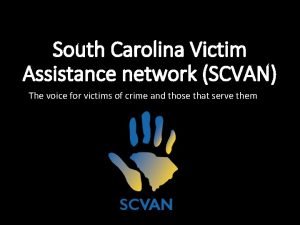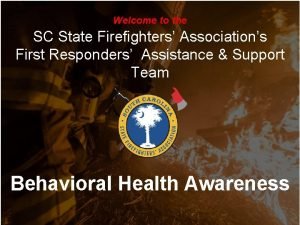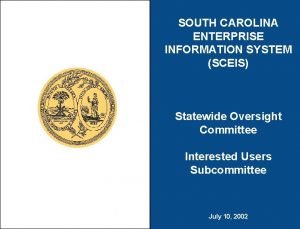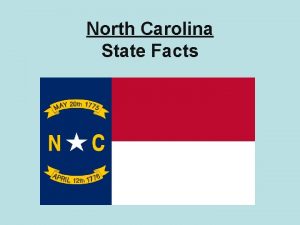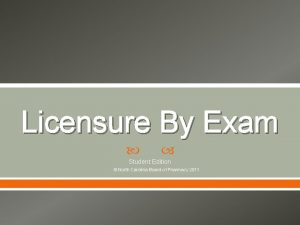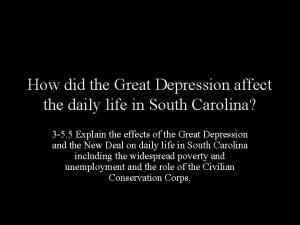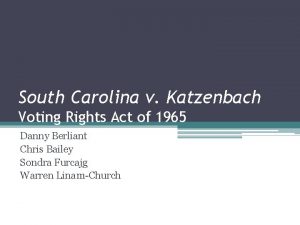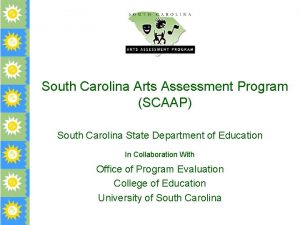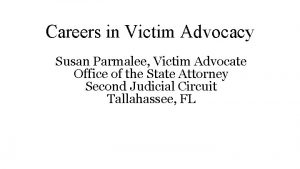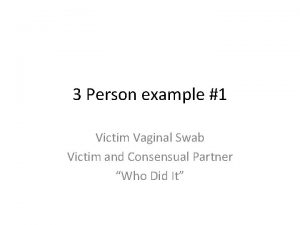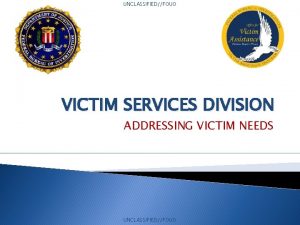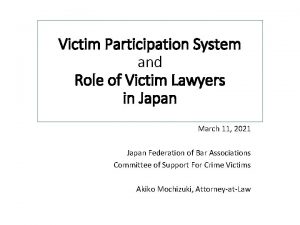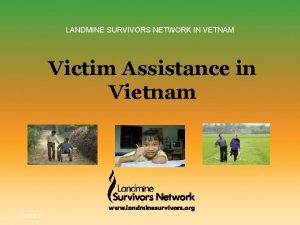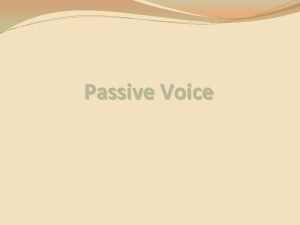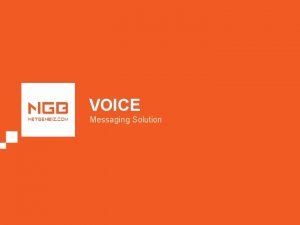South Carolina Victim Assistance network SCVAN The voice




















- Slides: 20

South Carolina Victim Assistance network (SCVAN) The voice for victims of crime and those that serve them

History (Key Federal Legislation) ØVictims of Crime Act (VOCA) § 1984, President Reagan § Federal financial support for direct services to victims of crime. VOCA is administered at the federal level through the U. S. DOJ for Victims of Crime which annually awards a grant to each State, the District of Columbia and U. S. Territories ØViolence Against Women Act (VAWA) § 1994, President Clinton § Combats violence against women ØJustice for All Act § 2004, President Bush § Includes the Crime Victims Rights Act (CVRA)

South Carolina ØSouth Carolina Crime Victims’ Bill of Rights January, 1998 • be treated with fairness, respect and dignity; • be free from intimidation or harm throughout the criminal and juvenile justice process; • be informed about victims' rights; • be reasonably informed about criminal proceedings; • be informed if the accused is arrested, released, or escapes; • confer with the prosecution before the case is heard in court; • be present at criminal proceedings where the accused has the right to be present; • be heard at proceedings affecting bond, bail, release, pleas or sentencing; • have reasonable access to documents relating to the crime before trial; • receive restitution from the adult or juvenile offenders; and • a reasonable, prompt and final conclusion of the case.

National Stats: DV & Sexual Violence ØSexual Violence • 1 in 5 women and 1 in 71 men will be raped in their lifetime. • Nearly 1 in 10 women assaulted by an intimate partner. • 81% of women and 35% of men report significant short or long-term effects: PTSD, Depression, etc. • CAMPUS: 1 in 5 women and 1 in 16 men are sexually assaulted while in college. • More than 90% of cases go unreported. ØIntimate Partner Violence • 1 in 3 women and 1 in 4 men have been physically abused by an intimate partner. • Adding the presence of a gun in a DV situation increases risk of homicide by 500%. *Statistics retrieved from National Coalition Against Domestic Violence Fact sheet 2015 and National Sexual Violence Resource Center Fact Sheet 2015

SC Stats ØSC is currently ranked #6 in women killed by men (Violence Policy Center) ØSexual Violence (between 2008 -12): Children below the age of 17 years of age accounted for 63% of sexual violence victims, followed by 18 -24 year olds. • • Most associated offense: Kidnapping 85% women Approx. 50% knew the perpetrator Approx. 25% was a family member *By Force and Without Consent: A Five Year Overview of Sexual Violence in South Carolina, 2008 – 2012, SC Dept. of Public Safety

EST 1984 • The South Carolina Victim Assistance Network (SCVAN) was and has provided coordination for representatives of all agencies involved in victim/witness services through its collaboration, publicity, advocacy, and victim assistance functions. • SCVAN sponsors training and events, and manages five grant-funded programs that provide services and resources to our state's crime victims.

We are here to: • help you fill in gaps in services to crime victims • provide advice and assistance to you • help you get what you need for your programs to run effectively • direct you to resources to supplement the services you provide to victims

Publicizes victim issues and resources • The SCVAN website • The Victim Assistance Email Distribution List/Listserv ØEmail: info@scvan. org • Social Media

Provides Direct Emergency Assistance Financial Relief for Victims Program • What does it pay for? • What are the eligibility guidelines?

What does the Financial Relief for Victims Fund pay for? Allowable costs include: · Food · Clothing · Prescriptions · Lodging · Door Locks · Home Repairs · Crime Scene Clean Up · Transportation · Medical Equipment

Eligibility guidelines • The victim must have suffered physical, psychological or financial harm within 90 days • The crime occurred within the jurisdiction of the state of South Carolina • If the victim is under 18 years of age, legal guardian or custodian must cooperate with the service provider during the application process • All other services and financial resources must be explored.

On our website… FOR ADVOCATES: • Procedure Form (must be signed by all advocates before using the fund) • Emergency Fund Application • Emergency Fund General Information • Approved Case Instructions FOR VENDORS: • Vendor Agreement Form • Information on becoming a vendor

Survival guides • In an effort to reduce the confusion that victim’s often experience after a crime occurs, SCVAN provides an online Victim Survival Guide (available in English and Spanish) to answer basic questions and updated contact information for services that victims may need.

Transitional Housing The mission of The Transitional Housing Program (TTHP) is to assist victims of crime to gain economic stability and achieve their personal goals. The Transitional Housing Program provides: • Rent and mortgage (one payment only) • Utility payments (water, lights, etc. ) • Security deposits (i. e rent, utilities)

Statewide Forensic Nurse Examiner (FNE) Coordinator • The Coordinator collaborates with existing Sexual Assault Nurse Examiner SANE/FNE nurses, hospitals, and Sexual Assault Response Team (SART) • The Coordinator also assists in the development of partnerships, called SARTs, between healthcare professionals, law enforcement officials, law enforcement victim advocates (LEVAs), solicitors and solicitor advocates, domestic violence agencies, and sexual assault centers, to improve delivery of services to victims of domestic violence and sexual assault.

Legal assistance to victims Provides holistic legal services to South Carolina crime victims across myriad of law areas and most importantly crime victims’ rights enforcement. The Program also hosts special initiatives designed to address the unique legal needs of South Carolina’s underserved victim populations, which currently include sexual assault, human trafficking survivors, immigrants and Native Americans.

Faith Based Victim Services Program • Create collaboration among faith-based organizations and local victim assistance programs to provide resources and to improve the range, quality and accessibility of services to crime victims.

Victims’ Rights Week • SCVAN sponsors an annual Victims’ Rights Week Conference in collaboration with the State Office of Victim Assistance (SOVA). Over 300 criminal justice professionals and victim service providers from across the state receive cutting-edge training on best practices in victim services. • Crime victims and professional service providers attend to learn from each other as well as experts in the field, share their experiences and meet others who “walk in their shoes. ” Victims pay homage to their lost loved ones during an intensely moving Unity Ceremony, and attend workshops devoted to helping them deal with grief, anger, and stress.


 Nc victim assistance network
Nc victim assistance network North carolina marschland
North carolina marschland Map of north carolina and south carolina
Map of north carolina and south carolina Maryland, virginia, north carolina, south carolina, georgia
Maryland, virginia, north carolina, south carolina, georgia Virginia, maryland, north carolina, south carolina, georgia
Virginia, maryland, north carolina, south carolina, georgia South carolina state firefighters association
South carolina state firefighters association Tiburon, south carolina
Tiburon, south carolina South carolina major rivers
South carolina major rivers South carolina employee withholding tax form
South carolina employee withholding tax form Types of turtles in south carolina
Types of turtles in south carolina South carolina the beautiful palmetto state
South carolina the beautiful palmetto state Sceis
Sceis South carolina fall line
South carolina fall line North carolina state bird flower and tree
North carolina state bird flower and tree Nc state symbol
Nc state symbol Map of nc lighthouses
Map of nc lighthouses South carolina board of pharmacy license renewal
South carolina board of pharmacy license renewal South carolina regions song
South carolina regions song How did the great depression affect daily life
How did the great depression affect daily life Regions of south carolina
Regions of south carolina South carolina v. katzenbach
South carolina v. katzenbach
